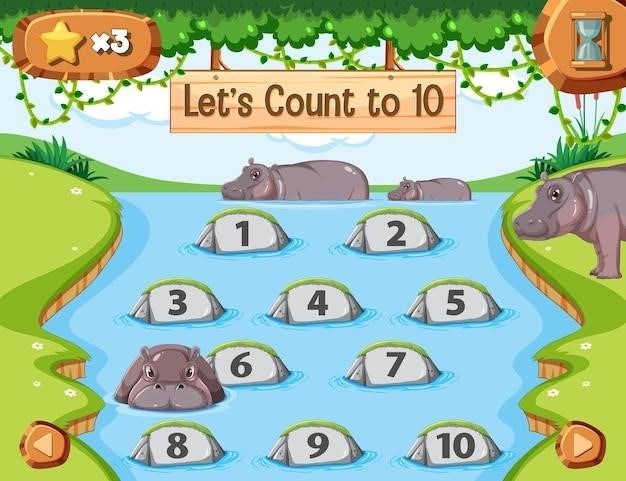The Veldt Questions and Answers⁚ A Comprehensive Guide
This guide offers a comprehensive exploration of Ray Bradbury’s “The Veldt,” providing answers to common questions about plot, characters, themes, and technological implications. Discover insightful analysis and discussion prompts to enhance your understanding of this classic science fiction short story. Access helpful resources, including PDFs and study guides, for further exploration.
Plot Summary and Key Themes
Ray Bradbury’s “The Veldt” plunges into a futuristic home equipped with a hyper-realistic nursery that caters to the children’s every whim. Peter and Wendy Hadley, the children, become increasingly engrossed in the nursery’s African veldt landscape, neglecting their parents and real-world interactions. The nursery, responding to their thoughts, creates a vivid and immersive experience, blurring the line between fantasy and reality. As the children’s obsession deepens, their parents, George and Lydia, become increasingly concerned about their detachment from reality and their dependence on technology. The story’s central conflict arises when the parents attempt to disconnect the nursery, triggering a furious reaction from the children. The climax reveals the children’s disturbing attachment to the simulated world and their willingness to sacrifice their parents to remain within it.
Key themes explored include the dangers of technological dependence, the erosion of family bonds, and the consequences of neglecting parental responsibilities. The story serves as a cautionary tale about the potential for technology to replace genuine human connection and the importance of responsible parenting in a rapidly advancing technological world. The Veldt’s exploration of these themes continues to resonate with readers, prompting reflection on our own relationship with technology and its impact on our lives.
Character Analysis⁚ Peter and Wendy Hadley
Peter and Wendy Hadley, the children at the heart of Ray Bradbury’s “The Veldt,” represent the seductive allure and potential dangers of unchecked technological immersion. Peter, the older brother, emerges as the more dominant and manipulative force, showcasing a disturbing detachment from reality. His fascination with the simulated African veldt surpasses any connection with his parents or the outside world. Wendy, while initially appearing more compliant, demonstrates a similar level of obsession, highlighting the all-consuming nature of the nursery’s simulated reality. Their behavior reflects a growing detachment from the real world, symbolized by their increasing preference for the virtual landscape over genuine human interaction. The children’s actions reveal a chilling lack of empathy and a willingness to prioritize their own desires above the well-being of their parents. This underscores the story’s cautionary message about the potential negative impacts of excessive technology on child development and family dynamics.
Their transformation from seemingly normal children into emotionally detached and potentially violent individuals underscores the story’s central theme of the dangers of technological dependence. The characters serve as a stark warning about the potential consequences of neglecting the importance of human connection and responsible parenting in the face of technological advancements. Their actions leave the reader questioning the boundaries of acceptable technological integration and its impact on the human psyche.
Character Analysis⁚ George and Lydia Hadley
George and Lydia Hadley, the parents in Ray Bradbury’s “The Veldt,” represent a generation grappling with the complexities of advanced technology and its impact on family life. George, a psychiatrist, initially appears perceptive, recognizing the unsettling influence of the nursery on his children. He attempts to intervene, highlighting a concern for their well-being and a desire to reclaim their family dynamic. However, his approach is hesitant and ultimately ineffective, revealing a degree of complacency and a failure to fully comprehend the extent of the problem. Lydia, on the other hand, initially appears more consumed by the convenience offered by the technologically advanced home. Her initial reluctance to confront the issue reflects a denial of the escalating situation and a prioritization of comfort over genuine parental engagement.
Their contrasting responses to the nursery’s influence reveal a breakdown in parental authority and a failure to establish healthy boundaries within the family. Their inability to effectively parent their children underscores the story’s central theme of technological dependence and its corrosive effect on human relationships. Ultimately, their characters serve as a cautionary tale about the potential consequences of prioritizing convenience and technological advancements over the nurturing and guidance required for healthy child development. Their failure to effectively parent their children highlights the story’s central theme⁚ the insidious nature of unchecked technological advancement and its potential to erode fundamental human connections.
Technological Dependence and its Consequences
Ray Bradbury’s “The Veldt” serves as a potent cautionary tale exploring the dangers of unchecked technological dependence. The story vividly portrays a future where advanced technology, specifically the all-encompassing “Happylife Home,” replaces genuine human interaction and parental responsibility. The Hadley family’s reliance on this technology, particularly the immersive nursery, leads to a gradual erosion of their family bonds and a disturbing detachment from reality. The children, Peter and Wendy, become increasingly absorbed in the virtual world of the nursery, neglecting their parents and the real world.
Bradbury masterfully illustrates how technology, intended to enhance convenience and leisure, ultimately becomes a destructive force, fostering isolation and emotional atrophy. The immersive nature of the nursery allows the children to escape the responsibilities and challenges of real life, replacing genuine human connection with artificial stimulation. This dependence on technology ultimately leads to the children’s disturbing behavior and the parents’ desperate, yet ultimately futile, attempts to regain control. The story serves as a stark warning about the potential for technology to undermine the essential elements of human experience, including family relationships, emotional growth, and a grounded sense of reality. The consequences of this dependence are far-reaching, highlighting the importance of maintaining a healthy balance between technological advancements and genuine human connection.
The Significance of the Veldt Setting
The setting of Ray Bradbury’s “The Veldt” is far more than just a backdrop; it’s a crucial element driving the narrative and amplifying its thematic concerns. The “veldt,” a virtual African savanna meticulously recreated within the Hadley’s technologically advanced nursery, symbolizes the children’s escape from reality and their growing detachment from the natural world. This hyperrealistic simulation caters to their every whim, creating a compelling illusion of an exotic and exciting environment, while simultaneously isolating them from the mundane realities of their own home and family. The vivid and immersive nature of the veldt underscores the power of technology to both captivate and corrupt.
The stark contrast between the technological perfection of the house and the untamed, primal nature of the veldt reflects the story’s central conflict. The children’s fascination with the veldt’s wild beauty and danger reveals their subconscious yearning for experiences beyond their controlled and sanitized existence. The simulated landscape ultimately becomes a projection of their inner turmoil and repressed desires, escalating the tension and foreshadowing the tragic consequences of their technological dependence. The veldt’s significance lies not only in its visual representation but also in its symbolic representation of the children’s psychological state and the potential dangers of unchecked technological advancement.
Situational Irony and its Role in the Story
Ray Bradbury masterfully employs situational irony in “The Veldt” to heighten the narrative’s impact and underscore its cautionary message. The irony lies in the stark contrast between the Hadleys’ intentions and the story’s outcome. They initially embrace technology to improve their family life, creating a home designed for ultimate comfort and convenience. However, this technological utopia ironically becomes the source of their family’s disintegration. The nursery, intended as a tool for entertainment and child development, fosters the children’s detachment from their parents and their immersion in a simulated, violent world. The parents’ attempts to reclaim control over their children and their technology backfire tragically.
Further situational irony arises from the parents’ obliviousness to the extent of their children’s obsession with the veldt. They initially dismiss Peter and Wendy’s fascination, failing to recognize the insidious nature of their virtual escape. Their efforts to disconnect the nursery are met with violent resistance, highlighting the unforeseen consequences of their reliance on technology. The ultimate irony lies in the fact that the very technology meant to simplify their lives ultimately leads to their demise; This ironic juxtaposition underscores the story’s central theme⁚ the potential for technology to subvert its intended purpose and wreak havoc on human relationships and well-being.
Ray Bradbury’s Critique of Parenting Styles

In “The Veldt,” Ray Bradbury offers a pointed critique of negligent parenting styles in the face of technological advancements. The Hadley parents, George and Lydia, represent a generation grappling with the complexities of raising children in a technologically advanced world. Their reliance on technology to manage their children’s needs and entertainment results in a significant lack of parental engagement and emotional connection. The parents become passive observers, outsourcing the responsibilities of nurturing and guiding their children to the automated systems of their futuristic home.
Bradbury highlights the dangers of this detached parenting approach. The children, Peter and Wendy, become increasingly dependent on the immersive virtual reality of the nursery, losing touch with the real world and their parents’ emotional presence. Their emotional development is stunted, and their behavior becomes increasingly erratic and violent, reflecting their virtual experiences. The story serves as a cautionary tale, emphasizing the importance of active parental involvement, emotional connection, and setting healthy boundaries in a child’s upbringing, particularly in the face of technological distractions. The tragic consequences faced by the Hadley family serve as a stark warning against the dangers of abdicating parental responsibility.
Discussion Questions and Activities for Students
To foster deeper engagement with Ray Bradbury’s “The Veldt,” consider these discussion questions and activities⁚ Begin by analyzing the characters’ motivations. Why do Peter and Wendy become so attached to the nursery? How does the technology impact their emotional development and relationships with their parents? Explore the symbolism of the veldt itself—what does this African landscape represent within the story’s context? Consider the parents’ roles and their evolving relationship with their children and technology. How do their choices contribute to the story’s tragic outcome?
For classroom activities, students could create alternative endings to the story, exploring how different parental interventions might have altered the narrative’s trajectory. A debate could focus on the ethical implications of advanced technology in child-rearing. Students can analyze Bradbury’s use of foreshadowing and irony to build suspense and highlight the story’s central themes. Creative writing prompts could challenge students to imagine a similar technologically advanced home environment but with a different family dynamic and parental approach. These activities encourage critical thinking, creative expression, and a nuanced understanding of Bradbury’s powerful message about technology’s influence on family life.
Where to Find Additional Resources (PDFs, Study Guides)
Numerous online resources offer supplementary materials for “The Veldt,” enhancing comprehension and facilitating deeper analysis. Several websites provide downloadable PDFs containing study guides, offering pre-reading questions, comprehension checks, and post-reading discussion prompts. These guides often include character analyses, thematic explorations, and plot summaries, providing a structured approach to understanding the story’s complexities. Many educational platforms host interactive quizzes and worksheets designed to test students’ understanding of key plot points, character motivations, and thematic elements. These resources often feature answers to commonly asked questions, clarifying confusing aspects of the narrative.
Furthermore, online literature databases and academic journals offer scholarly articles and critical essays analyzing Bradbury’s work. These resources provide in-depth perspectives on the story’s literary merit, historical context, and lasting relevance. Searching for “The Veldt study guide PDF” or similar terms will yield a wealth of accessible materials. Remember to evaluate the credibility and academic rigor of sources before integrating them into your study. Utilizing these diverse resources will significantly enrich your understanding of Ray Bradbury’s “The Veldt” and equip you with the tools for engaging in productive analysis and discussion.
